- Home
- Kristan Higgins
Always the Last to Know Page 18
Always the Last to Know Read online
Page 18
I’d managed to avoid imagining Noah with someone else. It was much more romantic to think of him staring out at the horizon, wind whipping his hair, arms crossed, his heart still mine. Occasionally, he showed up in my dreams, at times happy, sometimes angry and, worst of all, sad.
You can try to talk yourself out of loving someone. You can pitch it all the right ways, ways that make sense. We wanted different things. It was beautiful while it lasted. Not every relationship is meant to be forever. I’ll always have a soft spot for him. You never forget your first love. And all that makes sense . . . in your head, if not your heart. I still loved Noah, and sometimes I’d find myself walking down a street and letting out a growl of frustration. Why couldn’t he have at least tried to love my city, to open his heart to it? Why did he view Stoningham, that beautiful, pretentious, infuriating, lovely little town, as the be-all and end-all for our lives?
And who the hell was this Gillian person he was marrying?
A quick Facebook search brought me to her page. Gillian Epstein, the future Mrs. Noah Pelletier. She was an event planner—Epstein Events, not a very creative name.
Neither was she subtle about their engagement; her profile picture was her hand on a man’s chest. Noah’s chest. On her finger was a very pretty solitaire. Other photos showed the two of them at McMillan Orchards, in what was obviously their engagement photo shoot. I knew this because her page wasn’t private, and there were thirty-seven pictures captioned Engagement Photo Shoot!!! A lot of Stoningham people had weighed in on how beautiful they were, how happy they looked, couldn’t wait for the wedding, a year and a half away, for the love of God. If you were going to do it, just do it.
I didn’t like the look of her. She was pretty, but very done. Those too-perfect eyebrows. Eyelash extensions (or very blessed). She looked . . . smug. Oh, she was nice-looking, of course. Quite pretty.
But it was Noah’s face I really studied. His hair was cut short. Why on earth would he cut that beautiful, curly black hair? He looked—he was—older. I blew up the picture to see if he was really smiling, if his dark eyes crinkled and sparkled in that special way I remembered, and shit, yes, he did look happy.
My wild boy.
Tears spilled out of my eyes, surprising me. Obviously, I could’ve been his wife. I’d said no for all good reasons. He was uncompromising, and that wasn’t a good sign for a marriage. We didn’t want the same things, no matter how much we loved each other. So of course he was moving on. He deserved happiness, and I felt a hot, fast burn of shame that I hadn’t been able to give it to him. No. I’d broken his heart instead.
Then again, he’d broken mine, too. It was a mutual devastation.
So I would be glad for him. I took my unjustified sense of betrayal and stuffed it down deep. Before I could talk myself out of it, I took out my pastels and drew him a little card with a heart-shaped cloud on it and wrote, Congratulations on your engagement. I’m happy for you, Noah. I didn’t sign it. I didn’t have to.
He didn’t answer, nor did I expect him to. I just wanted him to know I wasn’t resentful or furious or sobbing on my desk . . . even if I’d sobbed a little.
In a way, his engagement freed me. I didn’t have to justify or prove myself, because Noah wasn’t out there, watching and waiting and judging anymore. I relaxed, not knowing my heart had been clenched with tension until it loosened. Something softened in me. Now when I saw that New York confidence, when I read about Aneni’s latest show, I felt the familiar sense of wonder, but it was no longer infected by envy. Maybe I’d never be them, those brilliant, sharp-edged, confident New Yorkers, but it was okay. I was doing just fine.
I got a couple of raises at St. Catherine’s—Sister Mary seemed to like me. Teaching was more fun than I’d expected, introducing the kids to Picasso and Seurat, Jackson Pollock and Georgia O’Keeffe. I was told I was loved multiple times throughout the day, and was the beneficiary of many hugs. At least once a month, a kindergartener or first grader would propose. It was good for the ego, all those bright eyes and happy faces, and it was nice to leave them, too, and return to my lovely apartment in the armpit of the city.
Though I was embarrassed by their utter vapidity, the couch paintings were profitable. I could bang out one of those in a couple of hours, depending on the medium and size. If it looked like something you’d buy at Target, so be it. I still got to sign my name and deposit a sizable check. I took down my website, since nothing I was doing needed to be immortalized in cyberspace.
I saw friends often and enjoyed the nights when I was alone, despite the urge to machete my way through Times Square on the way home every night. (Tourists taking pictures of neon signs should be thrown in jail. There. I was a true New Yorker.) I even dated a little. A slurry of first dates, one regrettable hookup, then a nice person named Sam. We dated for a few months—he was a funny guy who did something with the waste water of New York City. I liked him very much. We never had a bad time together. One night, when we’d been together long enough that we didn’t wonder if we were going to spend the weekend together, he said (in bed, no less), “I think I’m falling in love with you, Sadie.”
I replied with, “Oh, wow, that’s so . . . flattering.”
Thus ended Sam and me. I was grateful he broke it off before we got more entangled in each other’s lives. Breaking another heart was not something I could handle. And besides . . . I think I’m falling in love with you? Kind of tepid. I’d never had to ponder that with Noah. It was, to quote the great Stevie Wonder, signed, sealed, delivered. Done.
Once in a while, I’d check Gillian’s Facebook page. She was the kind of bride who gave me a rash—obsessed with the me-ness of the upcoming day. “Which bouquet do you like best?” she’d ask. Sure, sure, she was an event planner, but come on. She had Pinterest boards of dresses, bouquets, centerpieces, bridesmaid dresses. She had a bachelorette weekend with her twelve closest friends in Miami (those poor women . . . I imagined it cost them thousands), and every photo showed Gillian’s blinding white teeth in a near-feral smile. She wore a tiara that said BRIDE, in case we were unclear.
In short, she was milking every drop of attention she could possibly get, and while I tried not to hate her, I failed. She had a countdown to the wedding on all her pages. Every frickin’ day, she mentioned something wedding related, even posting a picture of the white corsety thing she’d be wearing under her gown. For Pete’s sake, as my mother would say.
Then, four months before the “Big Day,” there came a cyber-silence (not that I was stalking her or anything). Five days later, she posted that she appreciated all the concern and kindness, but she and Noah were going their separate ways. No one was to blame, and they’d stay friends. He was wonderful, and she wished him only the best.
I clicked off immediately, shoving aside the shameful rush of satisfaction. Their breakup was too personal for me to read about, even if she’d posted it for all to see. Noah didn’t have a Facebook page, except for his business: Noah Pelletier Fine Carpentry, on which he posted pictures of kitchen cabinets and decks and, in one case, a rather magical tree house made for one of the summer people.
I didn’t send a card this time. Somehow, some way, even though we hadn’t spoken for years now, I felt responsible for his heartache.
CHAPTER SEVENTEEN
John
Here are the things he knows.
The old man in the house . . . it’s him. He finally understands how the mirror works, and that old man is him. He’s gotten much older. He looks like his father.
The big man who helps him is named LeVon. He is a friend, but not really, because he works for John. But John thinks of him as his friend and would like to talk to him, but talking isn’t happening.
He has had something called a stroke and a BLT. Or not a BLT, but something like that. A BLT is a sandwich with bacon, and John likes bacon. But the thing he has means his brain has been hurt. His little daughter tells him not
to worry about this because he’ll be better soon. His big daughter says less. She is less happy than his little daughter, even though she has very pretty little girls herself. This means she is a mother now. John doesn’t remember that, or the little pretty girls, and that makes his eyes wet and sloppy.
When the little pretty girls are here, he likes it. Their voices are like birds, chirping and fast. He can’t understand most of the words they say, but sometimes it clicks. Grampy. Nana. Upstairs. Cookies. These he knows. They run to him and kiss him and are gone, like the . . . the . . . the flower-bugs that float and drift. Flutter-bugs. Flutter-byes. Something like that. He knows he is close with the word, and also wrong with the word.
John also knows his wife doesn’t love him anymore. She is important in some way, and she doesn’t like him very much, but she isn’t unkind. John tries to remember why she doesn’t love him, but he can’t remember or understand why that would be.
Barb. Barb. He wants to talk to his Barb. When he tries to make his mouth say her name, he only hears a wheezy old man—his now-self—making horrible sounds, so he stops trying. A bossy lady comes to see him and tries to get him to talk, but those sounds are too awful. Sometimes, if he moves his mouth too much, he drools, and this makes him feel small and stupid.
Barb.
Barb.
She looked so pretty on their wedding day, back in the long-ago.
They lived in a little red house in the long-ago. Not this house. Things were better there, but then there was something very sad, and she was different. Closed and locked. Case closed.
Case closed. Those words mean something to him, but he’s not sure why.
Barb lives here now. In his grandfather’s house. It’s her house now, not his. Not theirs.
Barb wanted something very much in the long-ago. Was it this house? No. But something to do with this house. A boat? No, but almost a boat, with the same starting sound, that’s what the bossy lady says when she tries to make him talk. The starting sound. Boat. Bank. Baby.
Baby. She wanted a baby. So did he. Lots of them. He wanted four, because four was a nice number, many but not too many. But they couldn’t find the baby. No, not find. Get the baby. No, not that, either. They couldn’t buy the baby?
Have the baby. They couldn’t have a baby, and Barb was pretending to be happy, but she wasn’t. She would have people over and make meals and light candles and pretend-smile, and he hated it. The . . . untruth of it. She would do those things and then he’d hear her crying in the bathroom, but she wouldn’t talk to him. Fine. Fine. That was a word he knew was a lie when Barb said it.
She had . . . pretended, pretended happiness, and did things with people John barely knew, and filled their days with people and work and . . . and . . . and there were always things in the way, her things, her projects and papers, and he just wanted it to be the two of them, like the time in the little red house, when home was home, not a place to do so much. Always, there were the new people who thought Barb was fine, fine.
One night in the long-ago, he heard that noise, that horrible again-noise of Barb crying in the bathroom, the slight echo, how hard she tried to be quiet, how she’d run the water so he wouldn’t know. He wanted to go in and tell her not to cry, that he would . . . find . . . no, not find, but do something to help. But she didn’t want him to know she was crying, which was why she had the water turned on.
He almost went in. He put his hand on the . . . the . . . that thing you turn to open a door, but then the water went off, and John jumped back. He walked silently down the hall to pretend he hadn’t heard her, didn’t know, hadn’t almost come in.
He should have gone in, he realizes now. Maybe she would still love him if he had gone in. He’s sorry he didn’t go into the bathroom. If he could do it over, he would have gone in and not let her pretend to be fine. He would’ve let her be not-fine. They could’ve been not-fine together.
But too much time passed, blurry time that John doesn’t remember. Then Barb was happy because of the baby, the girl baby, and he was the one who was alone. He was alone and no one listened to him, and he wasn’t sure what to say, anyway. He wanted four children, but there was only one and she was Barb’s, until a long time later, another one came, and this time, it was his baby. This time, he wasn’t shut away. He got to be needed again.
Sadie. Sadie!
He smiles because he remembered her name. Sadie. Such a pretty, happy name.
He tries to say it, but no sound comes out. His mouth is moving, but not the part that makes sound.
He wishes he could tell his daughter he remembers her name. He wishes he could say, Hi, Sadie, and make her smile and hug him. But he can’t, and this makes his eyes water, and so he tilts his head back and escapes to sleep once more.
CHAPTER EIGHTEEN
Juliet
It wasn’t anything to be ashamed of. Juliet knew this. That being said, she wouldn’t mind a paper bag to put over her head right now. Or no, a silk bag. They could afford it, that was for sure. That way, no one would have to look at each other and pass judgment.
Park Avenue Aesthetics.
Yep.
There were four of them, three women, including Juliet, and one man. One woman had that freakish, ageless look that didn’t say youth, but did say that plastic surgery was a legit addiction. Her skin was so tight it seemed like her whole face would crack if she blinked, which she seemed unable to do. Another woman was stunningly beautiful and, honestly, why was she here? Could she be a day over thirty? Don’t buy into the patriarchy, sweetheart! You’re perfect! Then again, what if she’d been made perfect here? If so, could Juliet have what she was having? The man was a normal-looking guy who had a pleasant face and fit-enough physique. What did he want to change? Why?
Go home, people, she wanted to say, hypocrite that she was.
Clearly, business was booming, because the office occupied two floors of a Park Avenue building and had a waterfall in the lobby. She’d been offered a bottle of mineral water when she came in, and the chairs were luxuriously comfy. Harp music interwoven with whale song was playing from discreetly placed speakers. There were many brochures on the table, but Juliet couldn’t bring herself to look at them.
Oliver would not be happy about this. Hopefully, he would never know. Juliet had taken out a separate credit card to hide the cost. Not that he would deny her anything (and not that she needed his approval to spend her hard-earned money) . . . she just didn’t want him to know she was here. That fear—if she pointed out an imperfection, he’d say, “You know what? You’re right.”
He, of course, was aging perfectly, as had his grandfather, who died at the age of 104 and looked about sixty. Helen, Oliver’s mother, could be a model, and she was seventy-five. That peachy British skin.
But Juliet was American, and ageism was a real issue.
Last week, Kathy Walker, who was six years older than Juliet, had come into the office with shocking red hair. Prior to this, Kathy had worn her prematurely white hair in a very elegant French twist, saying she couldn’t be bothered to color it. Now, it was cherry red and short—quite a lot like Arwen’s cut, gosh golly, big coincidence there.
Kathy had also taken to wearing stilettos with red soles . . . Christian Louboutins, which cost a small fortune. Juliet could afford them, too, but it felt morally wrong, paying two grand for a pair of painful shoes. Kathy had been swinging by Arwen’s office more and more, and Juliet’s less and less. When Juliet texted her, asking if she wanted to grab a drink, Kathy responded that it was a nice idea and she’d get back to her. That was three weeks ago.
Back when Juliet had been new, she and Kathy were the only women in the New Haven office of DJK, and they’d supported each other, eventually becoming friends. They’d had dinners together, sometimes with their husbands. Juliet and Oliver had gone to Kathy’s son’s wedding last year. Before Arwen got hired, Kathy and she sp
eculated about when a new partner would be named, since they were both on track to be tapped.
The past few months, Kathy had cooled considerably.
It didn’t matter, Juliet told herself. She’d keep her head down and do her job. Her work had always spoken for itself. Sadie was the fun one, the kind of person who made a new friend every fifteen minutes, or had people telling her their life stories after ten seconds in her presence. Juliet was the worker. Organized, determined, a big-picture thinker with a list of details. Clear eyes, full heart, can’t lose, as Friday Night Lights told her. That slogan had always spoken to her. Her heart had always been full, because she truly felt blessed in life, with a mother who encouraged and guided her, a stellar education, a wonderful husband, healthy children, a job she loved.
Clear eyes meant seeing what needed to be done. Oliver often marveled at her organizational skills. She had a monthly meal plan she put together so grocery shopping and dinner prep would go smoothly. Chore charts for the girls. She maintained the family calendar, juggled her and Oliver’s work schedules so at least one parent would be present at every school or sport event. She researched their vacation destinations, booked flights, found hotels or rentals. Scheduled the dentist, the doctor, took the girls shopping for clothes (by the way, Brianna probably needed a bra, and she’d try to make that a bonding experience, the way her mom had done for her).
It was the can’t lose part of the phrase that was coming into question. When Dave had appointed Arwen as the lead of the Hermanos building, Juliet had lost project management to a woman far less experienced than she was. She may have lost Kathy as well.
“Juliet Smith?” A strikingly beautiful woman with dark, dark skin and a shaved head stood in the doorway. “Ms. Smith?”
That was her. She’d given a fake name. “Hi,” she said, standing up.
“Right this way,” said the woman, smiling gently. “You’re new to us?”

 In Your Dreams
In Your Dreams Just One of the Guys
Just One of the Guys The Perfect Match
The Perfect Match Catch of the Day
Catch of the Day All I Ever Wanted
All I Ever Wanted Until There Was You
Until There Was You On Second Thought
On Second Thought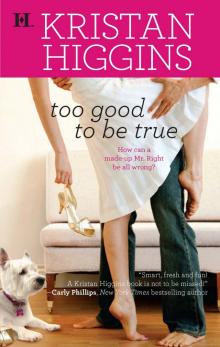 Too Good to Be True
Too Good to Be True My One and Only
My One and Only Fools Rush in
Fools Rush in The Next Best Thing
The Next Best Thing Somebody to Love
Somebody to Love Anything for You
Anything for You Waiting on You
Waiting on You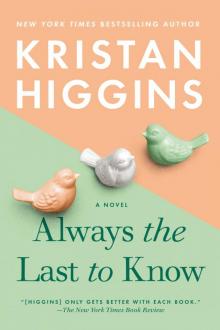 Always the Last to Know
Always the Last to Know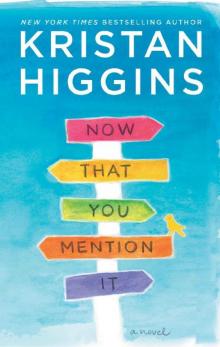 Now That You Mention It
Now That You Mention It Life and Other Inconveniences
Life and Other Inconveniences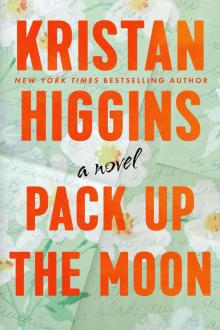 Pack Up the Moon
Pack Up the Moon Good Luck with That
Good Luck with That![Blue Heron [2] The Perfect Match Read online](http://i1.bookreadfree.com/i/03/25/blue_heron_2_the_perfect_match_preview.jpg) Blue Heron [2] The Perfect Match
Blue Heron [2] The Perfect Match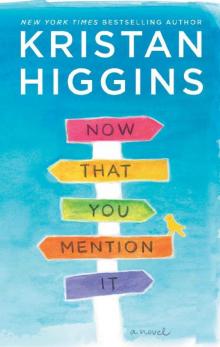 Now That You Mention It: A Novel
Now That You Mention It: A Novel